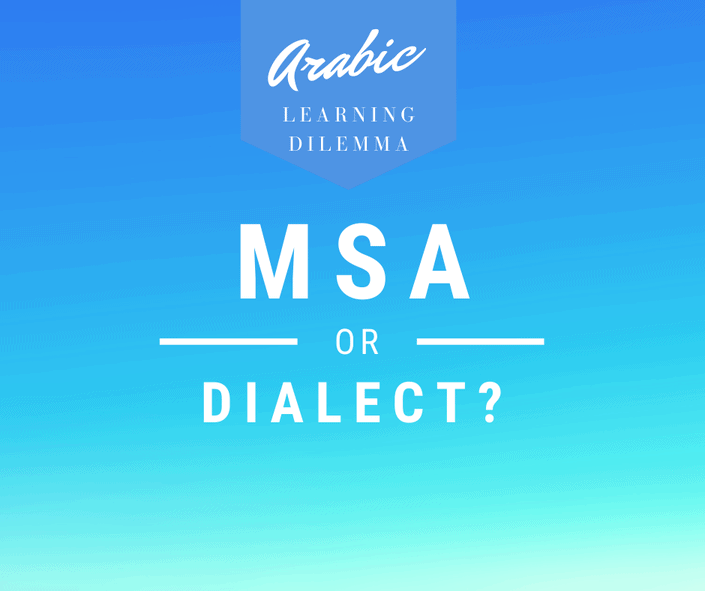Exploring the nine profiles of Arabic language learners to determine which form of Arabic will meet your personal needs and career objectives.
Before answering and unpacking this loaded question, if you still do not understand with certainty the difference between the formal form of Arabic, commonly known as Modern Standard Arabic (MSA), and a dialect, or colloquial Arabic; I explained it in detail here.
Many learners of MSA or its regional dialects would start asking themselves at some point in their learning journey if they had made the right decision by going for one form of Arabic over the other, or whether they wasted their focus and energy by trying too soon to acquire both simultaneously.
First of all, let us agree that making a decision, good or bad, is better than not making one at all. The fact that you took the first step and embarked on this awesome linguistic journey is a success in itself no matter how slow progress may seem.
Coming to a realization that you have picked the wrong language track is not a very bad thing.
Actually, that means you have now learned or gathered enough information to either doubt your earlier question or to completely reconsider it. And it is a part and parcel of your growth as a foreign language learner.
It just simply means that you did not make an informed decision back then.
So, do you need to learn MSA or a dialect? The right choice will depend on the learner’s primary motivation, career and life plans and even the type of personality.
Extroverts and introverts have almost the opposite success tracks on the different language modalities. Your career choices will also determine the type of language form you should pursue.
Similarly, your financial and personal situation may allow you more flexibility and options as to what , where and how to learn the language(s).
Evidently, it is a very nuanced topic and can take several pages to cover, but for the sake of time and brevity, I will try to keep it simple and straightforward. I can answer any questions in the comments section.
As I list a few learner’s profiles that can guide your language choice, please keep in mind that MSA is the conduit of choice for more abstract, formal and serious topics. It could be hard for the uneducated native speakers to use it because it is mostly text-based.
The colloquial dialects , on the other hand, are for everyday use and spoken by all. It is more of an oral medium.
Before I explain how your specific situation or profile should drive your decision, take a few minutes to watch this video. It provides a good insight from the perspective of a current learner of Arabic.
Now, let us go over these Arabic Learner profiles that can serve as a rough guide to help you decide which Arabic variant you need to focus on in your language learning journey :
Table of Contents
1–The heritage speaker
If you grew up in the West and lived with parents who immigrated from the Arab world and spoke Arabic inside the house, you are called a heritage speaker in the world of linguistics.
You can understand pretty much everything your parents and family members say. You may still remember some MSA from your childhood Arabic school and can speak some. However, you will find it very hard to speak MSA to express an opinion about politics, social issues or arts simply because you do not have the exposure and linguistic tools for that.
But you can easily engage in topics about food, cooking, clothing and family. Language experts call it Kitchen Arabic.
The choice then is very easy if you decided to learn or improve your Arabic.
Structured and serious study of MSA is what you need because you need tools that would allow you to read or listen to the news and read fiction, blogs and forums.
As for the Egyptian, Tunisian or Lebanese dialect that your parents speak and which you fully understand, it is something you have already acquired. All you need to improve your dialect speaking proficiency is make an effort to consistently speak it with the parents and cousins even when they address you in another language.
2- The Aspiring Research Professional
If you are pursuing a degree in journalism, foreign affairs or any discipline that requires extensive research and consumption of Arabic newspapers, books and literature, you will very likely use your interpretive reading skills more than expressive ones.
You will also likely read and analyze complex theories , ideas and historical facts, which are all documented in MSA.
Pursuing a dialect would be a waste of time at this stage, as it can be acquired more easily at a later time when and if you have to meet with the general population in an Arab country or community.
3- The community Worker
If you are a current or aspiring police officer, social worker, counselor or any job that requires outreach to local communities of Arab immigrants and refugees, your job role may require you to visit and spend considerable time with Arab-speaking mothers and youths.
These conversations are more likely to take place in a dialect because topics of discussion will revolve mainly around day-to-day issues of work, family and money.
Basic Arabic reading skills will be necessary in case you have to read the title of a document or a text message and things of that sort.
Let us suppose you are a Canadian or German social worker working with a family of recent Syrian refugees. The Syrian dialect will be of tremendous help even if the other party speaks broken German or English. The rapport and trust you can build by conversing with them in their own dialect are priceless.
4- The sales professional or businessman
In the Field of business and salesmanship, it is all about sealing the deal. But to achieve that you need to build a connection with your Arab clients or partners.
It is worth noting that language does not operate in a vacuum, as it is intertwined with culture.
Doing business with customers from the Arab world is very different from conducting it with Anglo-Saxons or Germans, for example. You have to spend more time with your Arab customers, eat meals and drink a lot of tea together in order to build rapport.
Being able to converse with your customer in a Gulf or Egyptian dialect, even sporadically, will go a long way in the effort to seal the deal and bring repeat business. Your customers may be able to speak English but they will prefer you over your colleague or competitor if you have that language edge.
MSA in this situation would not be needed because the purpose is to make conversation and win friends a.k.a clients.
5- The Introvert
Being an introverted student has its pros and cons when it comes to learning a language, according to psycho-linguistics, which is the study of language acquisition for adult and young students.
Introverts are more analytical and cautious in their approach to learning a new language. They are more self-conscious and tend to avoid taking risks in speaking a foreign language (FL) for fear of making mistakes.
However, just like in their native language, they are stronger in reading and writing in a FL than their extroverted counterparts.
This can drive many of the career choices they make, which can only be bolstered by focusing on MSA and sharpening their skill in the formal modality of Arabic.
It will certainly come in handy if they decide to become a political analyst, researcher or a strategist.
6- The extrovert
Unlike the introverts, extroverted students can improve their FL speaking skills much faster because of their less inhibited attitude toward speaking and making errors.
The reward of the energy gained from the conversation outweighs the cost they put on making mistakes while speaking the FL.
Parallels can be drawn to children who are still developing their native language skills as explained by famous linguist Skinner*. Because extroverts thrive on contact with others, they tend to choose careers that involve dealing with clients, such as sales, marketing and public relations.
The type of Arabic that can be useful in these types of jobs is the colloquial one and it would only make sense for them to pick up one Arabic dialect or two to gain a great competitive edge in their field.
7- The Quran Learner

As for students outside the Arab world who would like to learn Arabic to be able to read scriptures, such as The Holy Quran and hadith, MSA is the best choice because it is the closest to classical Arabic.
Although MSA may not be enough to easily read and understand the Quran since most educated native Arabic speakers have the same challenge, it will allow them to memorize Quranic verses with the correct pronunciation and read books that explain the intricacies of Quranic Arabic.
Again, MSA requires discipline and methodical learning in order to preserve the gains made during the learning stages.
The dialects would be nearly useless for students who want to learn Arabic for deeper understanding of their faith.
8- The Globetrotter
If you are someone who wants and can afford to travel overseas and spend time with the locals in the Arab world, it only makes sense to pick a dialect.
If you think you will visit more than one Arab country and want to pick a dialect that is understood in most Arab states, you should go with the Egyptian dialect.
Traveling and language immersion is the best way to improve your FL comprehension and speaking skills. However, you will need to be able to read street signs, maps and basic information. Therefore, basic reading skills of Arabic will be very helpful.
9- The Undecided
If you are studying Arabic in college or high school, most likely you are learning MSA. If you still do not know what form of Arabic to study, stick with MSA.
If you started with MSA and decided to pick up a dialect at a later time, it would be an easy transition or addition.
However, if you start by learning a dialect, which is highly oral, less structured and less rigid than MSA, switching or adding the latter would be more challenging. In addition, by starting with MSA, you learn the basic foundation of Arabic , the alphabets , morphology and phonology.
It only gets easier after that.
In a nutshell, dialects are more expressive and conversational, whereas MSA is more interpretive and text-based.
Find the closest profile above and use it to guide your decision. But whichever you end up picking, you are making a great choice by learning a beautiful language that can reward you in more ways that you can even think of.
Happy learning!
_____________________
Skinner, B.F. (1957). Verbal behavior. Acton, MA: Copley Publishing Group.





